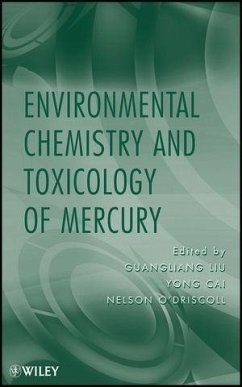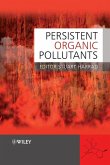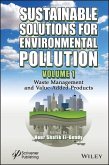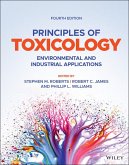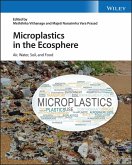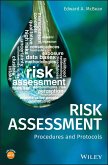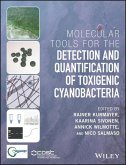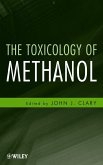Yong Cai, Guangliang Liu, Nelson O'Driscoll
Environmental Chemistry and Toxicology of Mercury
Herausgeber: Liu, Guangliang; O'Driscoll, Nelson; Cai, Yong
Yong Cai, Guangliang Liu, Nelson O'Driscoll
Environmental Chemistry and Toxicology of Mercury
Herausgeber: Liu, Guangliang; O'Driscoll, Nelson; Cai, Yong
- Gebundenes Buch
- Merkliste
- Auf die Merkliste
- Bewerten Bewerten
- Teilen
- Produkt teilen
- Produkterinnerung
- Produkterinnerung
This book provides the fundamentals, recent developments, and future research needs for critical mercury transformation and transport processes, as well as the experimental methods that have been employed in the recent studies. The coverage discusses the environmental behavior and toxicological effects of mercury on organisms, including humans, and provides case studies at the end of each chapter. Bringing together information normally spread across several books, this text is unique in covering the entire mercury cycle and providing a baseline for what is known and what uncertainties remain…mehr
Andere Kunden interessierten sich auch für
![Persistent Organic Pollutants Persistent Organic Pollutants]() Stuart HarradPersistent Organic Pollutants190,99 €
Stuart HarradPersistent Organic Pollutants190,99 €![Sustainable Solutions for Environmental Pollution, Volume 1 Sustainable Solutions for Environmental Pollution, Volume 1]() Sustainable Solutions for Environmental Pollution, Volume 1245,99 €
Sustainable Solutions for Environmental Pollution, Volume 1245,99 €![Principles of Toxicology Principles of Toxicology]() Principles of Toxicology260,99 €
Principles of Toxicology260,99 €![Microplastics in the Ecosphere Microplastics in the Ecosphere]() Microplastics in the Ecosphere257,99 €
Microplastics in the Ecosphere257,99 €![Risk Assessment Risk Assessment]() Edward A. McBeanRisk Assessment127,99 €
Edward A. McBeanRisk Assessment127,99 €![Molecular Tools for the Detection and Quantification of Toxigenic Cyanobacteria Molecular Tools for the Detection and Quantification of Toxigenic Cyanobacteria]() Molecular Tools for the Detection and Quantification of Toxigenic Cyanobacteria165,99 €
Molecular Tools for the Detection and Quantification of Toxigenic Cyanobacteria165,99 €![Methanol Methanol]() John J. ClaryMethanol156,99 €
John J. ClaryMethanol156,99 €-
-
-
This book provides the fundamentals, recent developments, and future research needs for critical mercury transformation and transport processes, as well as the experimental methods that have been employed in the recent studies. The coverage discusses the environmental behavior and toxicological effects of mercury on organisms, including humans, and provides case studies at the end of each chapter. Bringing together information normally spread across several books, this text is unique in covering the entire mercury cycle and providing a baseline for what is known and what uncertainties remain in respect to mercury cycling.
The book that looks at mercury's impact on the planet today
Recent research by the EPA has concluded that one in six women of childbearing age have unsafe levels of mercury in their bodies, which puts 630,000 newborn babies each year at risk of neurological impairment. Mercury poses severe risks to the health of animals and ecosystems around the world, and this book provides the essential information that anyone interested in environmental sciences should know about the fundamentals of the entire mercury cycle.
Comprised of four parts that present an overview of mercury in the environment, mercury transformations, transport, and bioaccumulation and toxicology, each chapter of Environmental Chemistry and Toxicology of Mercury includes the basic concepts of the targeted subject, a critical review of that subject, and the future research needs.
This book explains the environmental behavior and toxicological effects of mercury on humans and other organisms, and provides a baseline for what is known and what uncertainties remain in respect to mercury cycling. The chapters focus on the fundamental science underlying the environmental chemistry and fate of mercury. This work will be invaluable to a wide range of policy experts, environmental scientists, and other people requiring a comprehensive source for the state of the science in this field.
The book that looks at mercury's impact on the planet today
Recent research by the EPA has concluded that one in six women of childbearing age have unsafe levels of mercury in their bodies, which puts 630,000 newborn babies each year at risk of neurological impairment. Mercury poses severe risks to the health of animals and ecosystems around the world, and this book provides the essential information that anyone interested in environmental sciences should know about the fundamentals of the entire mercury cycle.
Comprised of four parts that present an overview of mercury in the environment, mercury transformations, transport, and bioaccumulation and toxicology, each chapter of Environmental Chemistry and Toxicology of Mercury includes the basic concepts of the targeted subject, a critical review of that subject, and the future research needs.
This book explains the environmental behavior and toxicological effects of mercury on humans and other organisms, and provides a baseline for what is known and what uncertainties remain in respect to mercury cycling. The chapters focus on the fundamental science underlying the environmental chemistry and fate of mercury. This work will be invaluable to a wide range of policy experts, environmental scientists, and other people requiring a comprehensive source for the state of the science in this field.
Produktdetails
- Produktdetails
- Verlag: Wiley & Sons
- 1. Auflage
- Seitenzahl: 600
- Erscheinungstermin: 3. Januar 2012
- Englisch
- Abmessung: 239mm x 160mm x 38mm
- Gewicht: 970g
- ISBN-13: 9780470578728
- ISBN-10: 0470578726
- Artikelnr.: 33684860
- Verlag: Wiley & Sons
- 1. Auflage
- Seitenzahl: 600
- Erscheinungstermin: 3. Januar 2012
- Englisch
- Abmessung: 239mm x 160mm x 38mm
- Gewicht: 970g
- ISBN-13: 9780470578728
- ISBN-10: 0470578726
- Artikelnr.: 33684860
Guangliang Liu, PhD, is Research Scientist in the Department of Chemistry and Biochemistry, Florida International University, where he manages the Mercury Laboratory. Yong Cai, PhD, is Professor in the Department of Chemistry and Biochemistry, Florida International University. He has been working on environmental chemistry and the geochemistry of mercury for almost twenty years. Nelson O'Driscoll, PhD, is Canada Research Chair in Environmental Biogeochemistry and Associate Professor in the Department of Earth and Environmental Science, Acadia University.
PREFACE xiii ACKNOWLEDGMENTS xv CONTRIBUTORS xvii 1 OVERVIEW OF MERCURY IN THE ENVIRONMENT 1 Guangliang Liu, Yong Cai, Nelson O'Driscoll, Xinbin Feng, and Guibin Jiang 1.1 Introduction
1 1.2 Toxicity and Health Risks of Mercury Exposure
2 1.3 Sources of Mercury
2 1.4 Overview of Mercury Biogeochemical Cycling
7 1.5 Structure of the Book
8 1.6 Concluding Remarks
9 References
9 PART I ANALYTICAL DEVELOPMENTS 13 2 ADVANCES IN SPECIATION ANALYSIS OF MERCURY IN THE ENVIRONMENT 15 Yanbin Li, Yongguang Yin, Guangliang Liu, and Yong Cai 2.1 Introduction
15 2.2 Sample Preparation for Hg Speciation in Environmental Samples
16 2.3 Application of GC Technique in Hg Speciation Analysis
32 2.4 Application of HPLC Technique in Hg Speciation Analysis
36 2.5 Application of Capillary Electrophoresis Techniques in Hg Speciation Analysis
39 2.6 Application of X-Ray Absorption Spectroscopy in Probing Chemical Microenvironment of Hg
40 2.7 Application of Stable Isotope Dilution Technique in Mercury Speciation Analysis
41 2.8 Summary
43 References
44 3 MEASURING GAS PHASE MERCURY EMISSIONS FROM INDUSTRIAL EFFLUENTS 59 Samuel J. Ippolito, Ylias M. Sabri, and Suresh K. Bhargava 3.1 Introduction
59 3.2 Standardized Methods for Measuring Mercury
72 3.3 Mercury Continuous Emission Monitors (CEMs)
81 3.4 Future Outlook
95 References
96 PART II SPECIATION AND TRANSFORMATION 111 4 ATMOSPHERIC CHEMISTRY OF MERCURY 113 Che-Jen Lin, Pattaraporn Singhasuk, and Simo O. Pehkonen 4.1 Introduction
113 4.2 The Overall Picture
114 4.3 Chemical Transformations in the Gas Phase
118 4.4 Chemical Transformations in the Aqueous Phase
131 4.5 Redox Chemistry at the Interface Between the Atmosphere and Earth's Surfaces
136 4.6 Atmospheric Implications of the Identified Redox Pathways
139 4.7 Future Research Needs
143 References
144 5 MICROBIAL TRANSFORMATIONS IN THE MERCURY CYCLE 155 Chu-Ching Lin, Nathan Yee, and Tamar Barkay 5.1 Introduction
155 5.2 Mercury Methylation
158 5.3 Methylmercury Degradation
168 5.4 Redox Cycling of Inorganic Hg
169 5.5 Conclusions
179 References
180 6 PHOTOREACTIONS OF MERCURY IN AQUATIC SYSTEMS 193 Emma E. Vost, Marc Amyot, and Nelson J. O'Driscoll 6.1 Significance of Mercury Photoreactions
193 6.2 Concepts in Mercury Photoreactions
194 6.3 Current Methods in Mercury Photochemistry
209 6.4 Summary
211 References
212 7 CHEMICAL SPECIATION OF MERCURY IN SOIL AND SEDIMENT 219 Ulf Skyllberg 7.1 Introduction
219 7.2 Physicochemical Properties, Oxidation States, Chemical Forms, Structures, and Concentrations of Mercury in the Environment
220 7.3 Aqueous Phase: Major Ligands and Their Affinities for Mercury(II)
222 7.4 Liquid and Solid Phases of Mercury in Soils and Sediments
229 7.5 Reactions of Mercury(II) with Soil and Sediment Particle Surfaces
231 7.6 Stabilization of Nanoparticulate Mercury(II) Sulfides by Natural Organic Matter
237 7.7 Solubility and Chemical Speciation of Mercury(II) in Soils and Sediments
237 7.8 Methods for Studying the Chemistry of Mercury(II) in Soils and Sediments
248 7.9 Future Research Needs
249 References
252 8 THE EFFECTS OF DISSOLVED ORGANIC MATTER ON MERCURY BIOGEOCHEMISTRY 259 Chase A. Gerbig, Joseph N. Ryan, and George R. Aiken 8.1 Introduction
259 8.2 Dissolved Organic Matter
260 8.3 Field Observations
263 8.4 Effects of DOM on Mercury Distributions Between Solution and Particles
265 8.5 Mercury Binding Strength
268 8.6 Mercury Binding Environment
271 8.7 Methylmercury Binding Strength and Environment
274 8.8 DOM and Mercury Mineral Dissolution
276 8.9 DOM and Mercury Mineral Precipitation
280 References
284 9 TRACKING GEOCHEMICAL TRANSFORMATIONS AND TRANSPORT OF MERCURY THROUGH ISOTOPE FRACTIONATION 293 Holger Hintelmann and Wang Zheng 9.1 Introduction
293 9.2 Fractionation of Mercury Isotopes in Environmental Processes
300 9.3 Hg Isotope Variations in Nature
315 9.4 Summary
319 References
320 PART III TRANSPORT AND FATE 329 10 ATMOSPHERIC TRANSPORT OF MERCURY 331 Oleg Travnikov 10.1 Introduction
331 10.2 General Concepts of Mercury Cycling in the Atmosphere
331 10.3 Methods for Studying Atmospheric Mercury Transport
336 10.4 Assessments of Airborne Mercury Pollution
342 10.5 Knowledge Gaps
354 References
356 11 ADSORPTION OF MERCURY ON SOLIDS IN THE AQUATIC ENVIRONMENT 367 Guangliang Liu, Yanbin Li, and Yong Cai 11.1 Introduction
367 11.2 Adsorption of Mercury on Solids
369 11.3 Role of Colloids in Mercury Adsorption
374 11.4 Concluding Remarks
380 References
381 12 EXCHANGE OF ELEMENTAL MERCURY BETWEEN THE OCEANS AND THE ATMOSPHERE 389 Asif Qureshi, Matthew Macleod, Elsie Sunderland, and Konrad Hungerbü hler 12.1 Introduction
389 12.2 Models of Gas Exchange of Elemental Mercury at the Air-Sea Interface
390 12.3 Field Studies of Ocean-To-Air Fluxes of Mercury
398 12.4 Rate Constants for Reduction and Oxidation of Mercury Species in Ocean Waters
400 12.5 Modeling Studies Estimating Oceanic Air-Sea Exchange
411 12.6 Conclusions and Future Directions
415 References
416 13 EXCHANGE OF MERCURY BETWEEN THE ATMOSPHERE AND TERRESTRIAL ECOSYSTEMS 423 Mae Sexauer Gustin 13.1 General Overview
423 13.2 Methods and Tools Applied for Measurement and Understanding of Air-Terrestrial Surface Exchange
425 13.3 Measured Fluxes
433 13.4 Conclusions
442 References
444 PART IV BIOACCUMULATION, TOXICITY, AND METALLOMICS 453 14 BIOACCUMULATION AND BIOMAGNIFICATION OF MERCURY THROUGH FOOD WEBS 455 Karen Kidd, Meredith Clayden, and Tim Jardine 14.1 Introduction
455 14.2 Mercury in Aquatic and Terrestrial Organisms
457 14.3 Mercury within Organisms
464 14.4 Factors Affecting Mercury in Biota
465 14.5 Biomagnification of Mercury Through Food Webs
474 14.6 Mercury Stable Isotopes in Bioaccumulation Studies
481 14.7 Case Study--Kejimkujik National Park and Historic Site, Nova Scotia, Canada
482 14.8 Conclusions
484 References
485 15 A REVIEW OF MERCURY TOXICITY WITH SPECIAL REFERENCE TO METHYLMERCURY 501 Mineshi Sakamoto, Katsuyuki Murata, Akiyoshi Kakita, and Masanori Sasaki 15.1 Introduction
501 15.2 Global Mercury Emission into the Atmosphere
502 15.3 Metabolism and Toxicity of Chemical Forms of Mercury
503 15.4 Risk Assessment of Prenatal Exposure to Methylmercury
509 15.5 Risks and Benefits of Fish Consumption for Brain Development
510 15.6 Exceptional Methylmercury Exposure Through Rice
510 15.7 Summary
511 References
511 16 METALLOMICS OF MERCURY: ROLE OF THIOLAND SELENOL-CONTAINING BIOMOLECULES 517 Feiyue Wang, Marcos Lemes, and Mohammad A.K. Khan 16.1 Introduction
517 16.2 Metallomics of Mercury
517 16.3 Mercury and Methylmercury Complexes with Thiol-Containing Biomolecules
519 16.4 Mercury and Methylmercury Binding to Selenol-Containing Biomolecules
522 16.5 Lability of Mercury or Methylmercury Complexes with Thiols or Selenols
524 16.6 Thiol-Containing Biomolecules in the Uptake and Metabolism of Mercury
526 16.7 Selenium Aided Biomineralization of Mercury and Methylmercury
529 16.8 Analytical and Modeling Approaches
531 16.9 Conclusion
538 References
538 17 HUMAN HEALTH SIGNIFICANCE OF DIETARY EXPOSURES TO METHYLMERCURY 545 Anna L. Choi and Philippe Grandjean 17.1 Introduction
545 17.2 Methylmercury Exposure
546 17.3 Nutrients in Fish and Seafood
548 17.4 Major Prospective Cohort Studies
549 17.5 Health Effects
552 17.6 Cardiovascular Outcomes
555 17.7 Nutrient and Methylmercury Exposure as Predictors of Developmental Outcomes
556 17.8 Confounding Variables
557 17.9 Risk Assessment and Exposure Imprecision
558 17.10 Conclusions
559 References
561 INDEX 569
1 1.2 Toxicity and Health Risks of Mercury Exposure
2 1.3 Sources of Mercury
2 1.4 Overview of Mercury Biogeochemical Cycling
7 1.5 Structure of the Book
8 1.6 Concluding Remarks
9 References
9 PART I ANALYTICAL DEVELOPMENTS 13 2 ADVANCES IN SPECIATION ANALYSIS OF MERCURY IN THE ENVIRONMENT 15 Yanbin Li, Yongguang Yin, Guangliang Liu, and Yong Cai 2.1 Introduction
15 2.2 Sample Preparation for Hg Speciation in Environmental Samples
16 2.3 Application of GC Technique in Hg Speciation Analysis
32 2.4 Application of HPLC Technique in Hg Speciation Analysis
36 2.5 Application of Capillary Electrophoresis Techniques in Hg Speciation Analysis
39 2.6 Application of X-Ray Absorption Spectroscopy in Probing Chemical Microenvironment of Hg
40 2.7 Application of Stable Isotope Dilution Technique in Mercury Speciation Analysis
41 2.8 Summary
43 References
44 3 MEASURING GAS PHASE MERCURY EMISSIONS FROM INDUSTRIAL EFFLUENTS 59 Samuel J. Ippolito, Ylias M. Sabri, and Suresh K. Bhargava 3.1 Introduction
59 3.2 Standardized Methods for Measuring Mercury
72 3.3 Mercury Continuous Emission Monitors (CEMs)
81 3.4 Future Outlook
95 References
96 PART II SPECIATION AND TRANSFORMATION 111 4 ATMOSPHERIC CHEMISTRY OF MERCURY 113 Che-Jen Lin, Pattaraporn Singhasuk, and Simo O. Pehkonen 4.1 Introduction
113 4.2 The Overall Picture
114 4.3 Chemical Transformations in the Gas Phase
118 4.4 Chemical Transformations in the Aqueous Phase
131 4.5 Redox Chemistry at the Interface Between the Atmosphere and Earth's Surfaces
136 4.6 Atmospheric Implications of the Identified Redox Pathways
139 4.7 Future Research Needs
143 References
144 5 MICROBIAL TRANSFORMATIONS IN THE MERCURY CYCLE 155 Chu-Ching Lin, Nathan Yee, and Tamar Barkay 5.1 Introduction
155 5.2 Mercury Methylation
158 5.3 Methylmercury Degradation
168 5.4 Redox Cycling of Inorganic Hg
169 5.5 Conclusions
179 References
180 6 PHOTOREACTIONS OF MERCURY IN AQUATIC SYSTEMS 193 Emma E. Vost, Marc Amyot, and Nelson J. O'Driscoll 6.1 Significance of Mercury Photoreactions
193 6.2 Concepts in Mercury Photoreactions
194 6.3 Current Methods in Mercury Photochemistry
209 6.4 Summary
211 References
212 7 CHEMICAL SPECIATION OF MERCURY IN SOIL AND SEDIMENT 219 Ulf Skyllberg 7.1 Introduction
219 7.2 Physicochemical Properties, Oxidation States, Chemical Forms, Structures, and Concentrations of Mercury in the Environment
220 7.3 Aqueous Phase: Major Ligands and Their Affinities for Mercury(II)
222 7.4 Liquid and Solid Phases of Mercury in Soils and Sediments
229 7.5 Reactions of Mercury(II) with Soil and Sediment Particle Surfaces
231 7.6 Stabilization of Nanoparticulate Mercury(II) Sulfides by Natural Organic Matter
237 7.7 Solubility and Chemical Speciation of Mercury(II) in Soils and Sediments
237 7.8 Methods for Studying the Chemistry of Mercury(II) in Soils and Sediments
248 7.9 Future Research Needs
249 References
252 8 THE EFFECTS OF DISSOLVED ORGANIC MATTER ON MERCURY BIOGEOCHEMISTRY 259 Chase A. Gerbig, Joseph N. Ryan, and George R. Aiken 8.1 Introduction
259 8.2 Dissolved Organic Matter
260 8.3 Field Observations
263 8.4 Effects of DOM on Mercury Distributions Between Solution and Particles
265 8.5 Mercury Binding Strength
268 8.6 Mercury Binding Environment
271 8.7 Methylmercury Binding Strength and Environment
274 8.8 DOM and Mercury Mineral Dissolution
276 8.9 DOM and Mercury Mineral Precipitation
280 References
284 9 TRACKING GEOCHEMICAL TRANSFORMATIONS AND TRANSPORT OF MERCURY THROUGH ISOTOPE FRACTIONATION 293 Holger Hintelmann and Wang Zheng 9.1 Introduction
293 9.2 Fractionation of Mercury Isotopes in Environmental Processes
300 9.3 Hg Isotope Variations in Nature
315 9.4 Summary
319 References
320 PART III TRANSPORT AND FATE 329 10 ATMOSPHERIC TRANSPORT OF MERCURY 331 Oleg Travnikov 10.1 Introduction
331 10.2 General Concepts of Mercury Cycling in the Atmosphere
331 10.3 Methods for Studying Atmospheric Mercury Transport
336 10.4 Assessments of Airborne Mercury Pollution
342 10.5 Knowledge Gaps
354 References
356 11 ADSORPTION OF MERCURY ON SOLIDS IN THE AQUATIC ENVIRONMENT 367 Guangliang Liu, Yanbin Li, and Yong Cai 11.1 Introduction
367 11.2 Adsorption of Mercury on Solids
369 11.3 Role of Colloids in Mercury Adsorption
374 11.4 Concluding Remarks
380 References
381 12 EXCHANGE OF ELEMENTAL MERCURY BETWEEN THE OCEANS AND THE ATMOSPHERE 389 Asif Qureshi, Matthew Macleod, Elsie Sunderland, and Konrad Hungerbü hler 12.1 Introduction
389 12.2 Models of Gas Exchange of Elemental Mercury at the Air-Sea Interface
390 12.3 Field Studies of Ocean-To-Air Fluxes of Mercury
398 12.4 Rate Constants for Reduction and Oxidation of Mercury Species in Ocean Waters
400 12.5 Modeling Studies Estimating Oceanic Air-Sea Exchange
411 12.6 Conclusions and Future Directions
415 References
416 13 EXCHANGE OF MERCURY BETWEEN THE ATMOSPHERE AND TERRESTRIAL ECOSYSTEMS 423 Mae Sexauer Gustin 13.1 General Overview
423 13.2 Methods and Tools Applied for Measurement and Understanding of Air-Terrestrial Surface Exchange
425 13.3 Measured Fluxes
433 13.4 Conclusions
442 References
444 PART IV BIOACCUMULATION, TOXICITY, AND METALLOMICS 453 14 BIOACCUMULATION AND BIOMAGNIFICATION OF MERCURY THROUGH FOOD WEBS 455 Karen Kidd, Meredith Clayden, and Tim Jardine 14.1 Introduction
455 14.2 Mercury in Aquatic and Terrestrial Organisms
457 14.3 Mercury within Organisms
464 14.4 Factors Affecting Mercury in Biota
465 14.5 Biomagnification of Mercury Through Food Webs
474 14.6 Mercury Stable Isotopes in Bioaccumulation Studies
481 14.7 Case Study--Kejimkujik National Park and Historic Site, Nova Scotia, Canada
482 14.8 Conclusions
484 References
485 15 A REVIEW OF MERCURY TOXICITY WITH SPECIAL REFERENCE TO METHYLMERCURY 501 Mineshi Sakamoto, Katsuyuki Murata, Akiyoshi Kakita, and Masanori Sasaki 15.1 Introduction
501 15.2 Global Mercury Emission into the Atmosphere
502 15.3 Metabolism and Toxicity of Chemical Forms of Mercury
503 15.4 Risk Assessment of Prenatal Exposure to Methylmercury
509 15.5 Risks and Benefits of Fish Consumption for Brain Development
510 15.6 Exceptional Methylmercury Exposure Through Rice
510 15.7 Summary
511 References
511 16 METALLOMICS OF MERCURY: ROLE OF THIOLAND SELENOL-CONTAINING BIOMOLECULES 517 Feiyue Wang, Marcos Lemes, and Mohammad A.K. Khan 16.1 Introduction
517 16.2 Metallomics of Mercury
517 16.3 Mercury and Methylmercury Complexes with Thiol-Containing Biomolecules
519 16.4 Mercury and Methylmercury Binding to Selenol-Containing Biomolecules
522 16.5 Lability of Mercury or Methylmercury Complexes with Thiols or Selenols
524 16.6 Thiol-Containing Biomolecules in the Uptake and Metabolism of Mercury
526 16.7 Selenium Aided Biomineralization of Mercury and Methylmercury
529 16.8 Analytical and Modeling Approaches
531 16.9 Conclusion
538 References
538 17 HUMAN HEALTH SIGNIFICANCE OF DIETARY EXPOSURES TO METHYLMERCURY 545 Anna L. Choi and Philippe Grandjean 17.1 Introduction
545 17.2 Methylmercury Exposure
546 17.3 Nutrients in Fish and Seafood
548 17.4 Major Prospective Cohort Studies
549 17.5 Health Effects
552 17.6 Cardiovascular Outcomes
555 17.7 Nutrient and Methylmercury Exposure as Predictors of Developmental Outcomes
556 17.8 Confounding Variables
557 17.9 Risk Assessment and Exposure Imprecision
558 17.10 Conclusions
559 References
561 INDEX 569
PREFACE xiii ACKNOWLEDGMENTS xv CONTRIBUTORS xvii 1 OVERVIEW OF MERCURY IN THE ENVIRONMENT 1 Guangliang Liu, Yong Cai, Nelson O'Driscoll, Xinbin Feng, and Guibin Jiang 1.1 Introduction
1 1.2 Toxicity and Health Risks of Mercury Exposure
2 1.3 Sources of Mercury
2 1.4 Overview of Mercury Biogeochemical Cycling
7 1.5 Structure of the Book
8 1.6 Concluding Remarks
9 References
9 PART I ANALYTICAL DEVELOPMENTS 13 2 ADVANCES IN SPECIATION ANALYSIS OF MERCURY IN THE ENVIRONMENT 15 Yanbin Li, Yongguang Yin, Guangliang Liu, and Yong Cai 2.1 Introduction
15 2.2 Sample Preparation for Hg Speciation in Environmental Samples
16 2.3 Application of GC Technique in Hg Speciation Analysis
32 2.4 Application of HPLC Technique in Hg Speciation Analysis
36 2.5 Application of Capillary Electrophoresis Techniques in Hg Speciation Analysis
39 2.6 Application of X-Ray Absorption Spectroscopy in Probing Chemical Microenvironment of Hg
40 2.7 Application of Stable Isotope Dilution Technique in Mercury Speciation Analysis
41 2.8 Summary
43 References
44 3 MEASURING GAS PHASE MERCURY EMISSIONS FROM INDUSTRIAL EFFLUENTS 59 Samuel J. Ippolito, Ylias M. Sabri, and Suresh K. Bhargava 3.1 Introduction
59 3.2 Standardized Methods for Measuring Mercury
72 3.3 Mercury Continuous Emission Monitors (CEMs)
81 3.4 Future Outlook
95 References
96 PART II SPECIATION AND TRANSFORMATION 111 4 ATMOSPHERIC CHEMISTRY OF MERCURY 113 Che-Jen Lin, Pattaraporn Singhasuk, and Simo O. Pehkonen 4.1 Introduction
113 4.2 The Overall Picture
114 4.3 Chemical Transformations in the Gas Phase
118 4.4 Chemical Transformations in the Aqueous Phase
131 4.5 Redox Chemistry at the Interface Between the Atmosphere and Earth's Surfaces
136 4.6 Atmospheric Implications of the Identified Redox Pathways
139 4.7 Future Research Needs
143 References
144 5 MICROBIAL TRANSFORMATIONS IN THE MERCURY CYCLE 155 Chu-Ching Lin, Nathan Yee, and Tamar Barkay 5.1 Introduction
155 5.2 Mercury Methylation
158 5.3 Methylmercury Degradation
168 5.4 Redox Cycling of Inorganic Hg
169 5.5 Conclusions
179 References
180 6 PHOTOREACTIONS OF MERCURY IN AQUATIC SYSTEMS 193 Emma E. Vost, Marc Amyot, and Nelson J. O'Driscoll 6.1 Significance of Mercury Photoreactions
193 6.2 Concepts in Mercury Photoreactions
194 6.3 Current Methods in Mercury Photochemistry
209 6.4 Summary
211 References
212 7 CHEMICAL SPECIATION OF MERCURY IN SOIL AND SEDIMENT 219 Ulf Skyllberg 7.1 Introduction
219 7.2 Physicochemical Properties, Oxidation States, Chemical Forms, Structures, and Concentrations of Mercury in the Environment
220 7.3 Aqueous Phase: Major Ligands and Their Affinities for Mercury(II)
222 7.4 Liquid and Solid Phases of Mercury in Soils and Sediments
229 7.5 Reactions of Mercury(II) with Soil and Sediment Particle Surfaces
231 7.6 Stabilization of Nanoparticulate Mercury(II) Sulfides by Natural Organic Matter
237 7.7 Solubility and Chemical Speciation of Mercury(II) in Soils and Sediments
237 7.8 Methods for Studying the Chemistry of Mercury(II) in Soils and Sediments
248 7.9 Future Research Needs
249 References
252 8 THE EFFECTS OF DISSOLVED ORGANIC MATTER ON MERCURY BIOGEOCHEMISTRY 259 Chase A. Gerbig, Joseph N. Ryan, and George R. Aiken 8.1 Introduction
259 8.2 Dissolved Organic Matter
260 8.3 Field Observations
263 8.4 Effects of DOM on Mercury Distributions Between Solution and Particles
265 8.5 Mercury Binding Strength
268 8.6 Mercury Binding Environment
271 8.7 Methylmercury Binding Strength and Environment
274 8.8 DOM and Mercury Mineral Dissolution
276 8.9 DOM and Mercury Mineral Precipitation
280 References
284 9 TRACKING GEOCHEMICAL TRANSFORMATIONS AND TRANSPORT OF MERCURY THROUGH ISOTOPE FRACTIONATION 293 Holger Hintelmann and Wang Zheng 9.1 Introduction
293 9.2 Fractionation of Mercury Isotopes in Environmental Processes
300 9.3 Hg Isotope Variations in Nature
315 9.4 Summary
319 References
320 PART III TRANSPORT AND FATE 329 10 ATMOSPHERIC TRANSPORT OF MERCURY 331 Oleg Travnikov 10.1 Introduction
331 10.2 General Concepts of Mercury Cycling in the Atmosphere
331 10.3 Methods for Studying Atmospheric Mercury Transport
336 10.4 Assessments of Airborne Mercury Pollution
342 10.5 Knowledge Gaps
354 References
356 11 ADSORPTION OF MERCURY ON SOLIDS IN THE AQUATIC ENVIRONMENT 367 Guangliang Liu, Yanbin Li, and Yong Cai 11.1 Introduction
367 11.2 Adsorption of Mercury on Solids
369 11.3 Role of Colloids in Mercury Adsorption
374 11.4 Concluding Remarks
380 References
381 12 EXCHANGE OF ELEMENTAL MERCURY BETWEEN THE OCEANS AND THE ATMOSPHERE 389 Asif Qureshi, Matthew Macleod, Elsie Sunderland, and Konrad Hungerbü hler 12.1 Introduction
389 12.2 Models of Gas Exchange of Elemental Mercury at the Air-Sea Interface
390 12.3 Field Studies of Ocean-To-Air Fluxes of Mercury
398 12.4 Rate Constants for Reduction and Oxidation of Mercury Species in Ocean Waters
400 12.5 Modeling Studies Estimating Oceanic Air-Sea Exchange
411 12.6 Conclusions and Future Directions
415 References
416 13 EXCHANGE OF MERCURY BETWEEN THE ATMOSPHERE AND TERRESTRIAL ECOSYSTEMS 423 Mae Sexauer Gustin 13.1 General Overview
423 13.2 Methods and Tools Applied for Measurement and Understanding of Air-Terrestrial Surface Exchange
425 13.3 Measured Fluxes
433 13.4 Conclusions
442 References
444 PART IV BIOACCUMULATION, TOXICITY, AND METALLOMICS 453 14 BIOACCUMULATION AND BIOMAGNIFICATION OF MERCURY THROUGH FOOD WEBS 455 Karen Kidd, Meredith Clayden, and Tim Jardine 14.1 Introduction
455 14.2 Mercury in Aquatic and Terrestrial Organisms
457 14.3 Mercury within Organisms
464 14.4 Factors Affecting Mercury in Biota
465 14.5 Biomagnification of Mercury Through Food Webs
474 14.6 Mercury Stable Isotopes in Bioaccumulation Studies
481 14.7 Case Study--Kejimkujik National Park and Historic Site, Nova Scotia, Canada
482 14.8 Conclusions
484 References
485 15 A REVIEW OF MERCURY TOXICITY WITH SPECIAL REFERENCE TO METHYLMERCURY 501 Mineshi Sakamoto, Katsuyuki Murata, Akiyoshi Kakita, and Masanori Sasaki 15.1 Introduction
501 15.2 Global Mercury Emission into the Atmosphere
502 15.3 Metabolism and Toxicity of Chemical Forms of Mercury
503 15.4 Risk Assessment of Prenatal Exposure to Methylmercury
509 15.5 Risks and Benefits of Fish Consumption for Brain Development
510 15.6 Exceptional Methylmercury Exposure Through Rice
510 15.7 Summary
511 References
511 16 METALLOMICS OF MERCURY: ROLE OF THIOLAND SELENOL-CONTAINING BIOMOLECULES 517 Feiyue Wang, Marcos Lemes, and Mohammad A.K. Khan 16.1 Introduction
517 16.2 Metallomics of Mercury
517 16.3 Mercury and Methylmercury Complexes with Thiol-Containing Biomolecules
519 16.4 Mercury and Methylmercury Binding to Selenol-Containing Biomolecules
522 16.5 Lability of Mercury or Methylmercury Complexes with Thiols or Selenols
524 16.6 Thiol-Containing Biomolecules in the Uptake and Metabolism of Mercury
526 16.7 Selenium Aided Biomineralization of Mercury and Methylmercury
529 16.8 Analytical and Modeling Approaches
531 16.9 Conclusion
538 References
538 17 HUMAN HEALTH SIGNIFICANCE OF DIETARY EXPOSURES TO METHYLMERCURY 545 Anna L. Choi and Philippe Grandjean 17.1 Introduction
545 17.2 Methylmercury Exposure
546 17.3 Nutrients in Fish and Seafood
548 17.4 Major Prospective Cohort Studies
549 17.5 Health Effects
552 17.6 Cardiovascular Outcomes
555 17.7 Nutrient and Methylmercury Exposure as Predictors of Developmental Outcomes
556 17.8 Confounding Variables
557 17.9 Risk Assessment and Exposure Imprecision
558 17.10 Conclusions
559 References
561 INDEX 569
1 1.2 Toxicity and Health Risks of Mercury Exposure
2 1.3 Sources of Mercury
2 1.4 Overview of Mercury Biogeochemical Cycling
7 1.5 Structure of the Book
8 1.6 Concluding Remarks
9 References
9 PART I ANALYTICAL DEVELOPMENTS 13 2 ADVANCES IN SPECIATION ANALYSIS OF MERCURY IN THE ENVIRONMENT 15 Yanbin Li, Yongguang Yin, Guangliang Liu, and Yong Cai 2.1 Introduction
15 2.2 Sample Preparation for Hg Speciation in Environmental Samples
16 2.3 Application of GC Technique in Hg Speciation Analysis
32 2.4 Application of HPLC Technique in Hg Speciation Analysis
36 2.5 Application of Capillary Electrophoresis Techniques in Hg Speciation Analysis
39 2.6 Application of X-Ray Absorption Spectroscopy in Probing Chemical Microenvironment of Hg
40 2.7 Application of Stable Isotope Dilution Technique in Mercury Speciation Analysis
41 2.8 Summary
43 References
44 3 MEASURING GAS PHASE MERCURY EMISSIONS FROM INDUSTRIAL EFFLUENTS 59 Samuel J. Ippolito, Ylias M. Sabri, and Suresh K. Bhargava 3.1 Introduction
59 3.2 Standardized Methods for Measuring Mercury
72 3.3 Mercury Continuous Emission Monitors (CEMs)
81 3.4 Future Outlook
95 References
96 PART II SPECIATION AND TRANSFORMATION 111 4 ATMOSPHERIC CHEMISTRY OF MERCURY 113 Che-Jen Lin, Pattaraporn Singhasuk, and Simo O. Pehkonen 4.1 Introduction
113 4.2 The Overall Picture
114 4.3 Chemical Transformations in the Gas Phase
118 4.4 Chemical Transformations in the Aqueous Phase
131 4.5 Redox Chemistry at the Interface Between the Atmosphere and Earth's Surfaces
136 4.6 Atmospheric Implications of the Identified Redox Pathways
139 4.7 Future Research Needs
143 References
144 5 MICROBIAL TRANSFORMATIONS IN THE MERCURY CYCLE 155 Chu-Ching Lin, Nathan Yee, and Tamar Barkay 5.1 Introduction
155 5.2 Mercury Methylation
158 5.3 Methylmercury Degradation
168 5.4 Redox Cycling of Inorganic Hg
169 5.5 Conclusions
179 References
180 6 PHOTOREACTIONS OF MERCURY IN AQUATIC SYSTEMS 193 Emma E. Vost, Marc Amyot, and Nelson J. O'Driscoll 6.1 Significance of Mercury Photoreactions
193 6.2 Concepts in Mercury Photoreactions
194 6.3 Current Methods in Mercury Photochemistry
209 6.4 Summary
211 References
212 7 CHEMICAL SPECIATION OF MERCURY IN SOIL AND SEDIMENT 219 Ulf Skyllberg 7.1 Introduction
219 7.2 Physicochemical Properties, Oxidation States, Chemical Forms, Structures, and Concentrations of Mercury in the Environment
220 7.3 Aqueous Phase: Major Ligands and Their Affinities for Mercury(II)
222 7.4 Liquid and Solid Phases of Mercury in Soils and Sediments
229 7.5 Reactions of Mercury(II) with Soil and Sediment Particle Surfaces
231 7.6 Stabilization of Nanoparticulate Mercury(II) Sulfides by Natural Organic Matter
237 7.7 Solubility and Chemical Speciation of Mercury(II) in Soils and Sediments
237 7.8 Methods for Studying the Chemistry of Mercury(II) in Soils and Sediments
248 7.9 Future Research Needs
249 References
252 8 THE EFFECTS OF DISSOLVED ORGANIC MATTER ON MERCURY BIOGEOCHEMISTRY 259 Chase A. Gerbig, Joseph N. Ryan, and George R. Aiken 8.1 Introduction
259 8.2 Dissolved Organic Matter
260 8.3 Field Observations
263 8.4 Effects of DOM on Mercury Distributions Between Solution and Particles
265 8.5 Mercury Binding Strength
268 8.6 Mercury Binding Environment
271 8.7 Methylmercury Binding Strength and Environment
274 8.8 DOM and Mercury Mineral Dissolution
276 8.9 DOM and Mercury Mineral Precipitation
280 References
284 9 TRACKING GEOCHEMICAL TRANSFORMATIONS AND TRANSPORT OF MERCURY THROUGH ISOTOPE FRACTIONATION 293 Holger Hintelmann and Wang Zheng 9.1 Introduction
293 9.2 Fractionation of Mercury Isotopes in Environmental Processes
300 9.3 Hg Isotope Variations in Nature
315 9.4 Summary
319 References
320 PART III TRANSPORT AND FATE 329 10 ATMOSPHERIC TRANSPORT OF MERCURY 331 Oleg Travnikov 10.1 Introduction
331 10.2 General Concepts of Mercury Cycling in the Atmosphere
331 10.3 Methods for Studying Atmospheric Mercury Transport
336 10.4 Assessments of Airborne Mercury Pollution
342 10.5 Knowledge Gaps
354 References
356 11 ADSORPTION OF MERCURY ON SOLIDS IN THE AQUATIC ENVIRONMENT 367 Guangliang Liu, Yanbin Li, and Yong Cai 11.1 Introduction
367 11.2 Adsorption of Mercury on Solids
369 11.3 Role of Colloids in Mercury Adsorption
374 11.4 Concluding Remarks
380 References
381 12 EXCHANGE OF ELEMENTAL MERCURY BETWEEN THE OCEANS AND THE ATMOSPHERE 389 Asif Qureshi, Matthew Macleod, Elsie Sunderland, and Konrad Hungerbü hler 12.1 Introduction
389 12.2 Models of Gas Exchange of Elemental Mercury at the Air-Sea Interface
390 12.3 Field Studies of Ocean-To-Air Fluxes of Mercury
398 12.4 Rate Constants for Reduction and Oxidation of Mercury Species in Ocean Waters
400 12.5 Modeling Studies Estimating Oceanic Air-Sea Exchange
411 12.6 Conclusions and Future Directions
415 References
416 13 EXCHANGE OF MERCURY BETWEEN THE ATMOSPHERE AND TERRESTRIAL ECOSYSTEMS 423 Mae Sexauer Gustin 13.1 General Overview
423 13.2 Methods and Tools Applied for Measurement and Understanding of Air-Terrestrial Surface Exchange
425 13.3 Measured Fluxes
433 13.4 Conclusions
442 References
444 PART IV BIOACCUMULATION, TOXICITY, AND METALLOMICS 453 14 BIOACCUMULATION AND BIOMAGNIFICATION OF MERCURY THROUGH FOOD WEBS 455 Karen Kidd, Meredith Clayden, and Tim Jardine 14.1 Introduction
455 14.2 Mercury in Aquatic and Terrestrial Organisms
457 14.3 Mercury within Organisms
464 14.4 Factors Affecting Mercury in Biota
465 14.5 Biomagnification of Mercury Through Food Webs
474 14.6 Mercury Stable Isotopes in Bioaccumulation Studies
481 14.7 Case Study--Kejimkujik National Park and Historic Site, Nova Scotia, Canada
482 14.8 Conclusions
484 References
485 15 A REVIEW OF MERCURY TOXICITY WITH SPECIAL REFERENCE TO METHYLMERCURY 501 Mineshi Sakamoto, Katsuyuki Murata, Akiyoshi Kakita, and Masanori Sasaki 15.1 Introduction
501 15.2 Global Mercury Emission into the Atmosphere
502 15.3 Metabolism and Toxicity of Chemical Forms of Mercury
503 15.4 Risk Assessment of Prenatal Exposure to Methylmercury
509 15.5 Risks and Benefits of Fish Consumption for Brain Development
510 15.6 Exceptional Methylmercury Exposure Through Rice
510 15.7 Summary
511 References
511 16 METALLOMICS OF MERCURY: ROLE OF THIOLAND SELENOL-CONTAINING BIOMOLECULES 517 Feiyue Wang, Marcos Lemes, and Mohammad A.K. Khan 16.1 Introduction
517 16.2 Metallomics of Mercury
517 16.3 Mercury and Methylmercury Complexes with Thiol-Containing Biomolecules
519 16.4 Mercury and Methylmercury Binding to Selenol-Containing Biomolecules
522 16.5 Lability of Mercury or Methylmercury Complexes with Thiols or Selenols
524 16.6 Thiol-Containing Biomolecules in the Uptake and Metabolism of Mercury
526 16.7 Selenium Aided Biomineralization of Mercury and Methylmercury
529 16.8 Analytical and Modeling Approaches
531 16.9 Conclusion
538 References
538 17 HUMAN HEALTH SIGNIFICANCE OF DIETARY EXPOSURES TO METHYLMERCURY 545 Anna L. Choi and Philippe Grandjean 17.1 Introduction
545 17.2 Methylmercury Exposure
546 17.3 Nutrients in Fish and Seafood
548 17.4 Major Prospective Cohort Studies
549 17.5 Health Effects
552 17.6 Cardiovascular Outcomes
555 17.7 Nutrient and Methylmercury Exposure as Predictors of Developmental Outcomes
556 17.8 Confounding Variables
557 17.9 Risk Assessment and Exposure Imprecision
558 17.10 Conclusions
559 References
561 INDEX 569

